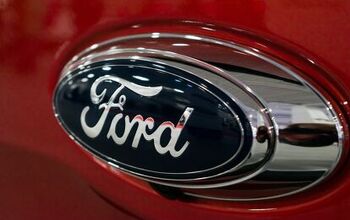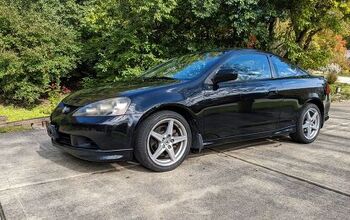Fulminating Over Ford

Ford announced yesterday, via a filing with investors, that by 2020 there will only be two conventional cars (or gas-fueled cars, at least) in its lineup. Those models will be the venerable Mustang and the upcoming Focus Active.
I wrote our news hit on it, and in my rush to get it online, I perhaps wasn’t as in-depth with context as I could’ve been. I’d like to make up for that by digging more, both into the greater context of what’s a tectonic shift in product portfolio for a major, full-line automaker, and flesh out my thoughts on what it all means.
Perusing a few other news pieces and our own comments on the piece, I realized I had a lot more to say, both in terms of factual context and my opinion as a card-carrying automotive journalist (alright, we don’t really carry cards, other than our business cards).
Let’s start with the financials. The New York Times reported Ford is losing money on the Focus, Fiesta, and Fusion. Thinking bigger picture, Ford is planning on cutting $11.5 billion from its operating costs, despite having $1.7 billion in net income in the first three months of this year, which is 9 percent more than in 2017. Ford also wants to reduce future spending from $34 billion by 2022 to $29 billion. The automaker also reported a decline in profits or a loss in each global region in which it sells cars.
Moving over to sales, it’s not a secret that crossovers are crazy hot right now, and have been for several years. It’s also no secret that even though most of the current stable of Ford commuter cars are considered more good than bad – let’s leave the forgotten C-Max and outdated Taurus out of this and focus on the Focus, Fusion, and Fiesta – they still don’t compete, for whatever reason, with perennial hot sellers like the Toyota Camry and Corolla and the Honda Accord and Civic.
For example, the Fusion is not only outsold by the Accord and Camry so far this year, it’s also down 15 percent compared to its own year-to-date sales from last year. Meanwhile, the Edge midsize crossover was up 18 percent in March compared to last year and 2 percent year to date. According to Ward’s Auto, cars make up 32.4 percent of the domestic sales mix, while crossovers make up 38.2 percent.
On the surface, this looks like a logical business decision. With Ford anticipating that crossover demand will continue to grow, and also looking to cut costs, it’s not at all surprising that Ford would look at money-losing vehicles and decide not only to drop them, but to no bother replacing them with improved models.
Our rivals over at Jalopnik even defended Ford’s decision on this grounds – Americans aren’t buying enough sedans, and enough Ford sedans specifically, so why not go all-in on trucks and crossovers? Especially since crossovers no longer force buyers to pay the fuel economy penalties they once did? Not to mention that car-based crossovers now have car-like rides, and most car buyers don’t give a flying truck about handling, anyway?
Thing is, the car business isn’t always logical or rational. More to the point, it’s one thing to make what seems to be a mostly logical decision, but one must consider consequences.
For one, there’s the potential possibility that gas prices could spike. Yes, it’s true crossovers are more fuel efficient than ever, but Ford’s Escape, for example, still doesn’t match the Focus for gas mileage. If pump prices jump drastically again, and a buyer compares an Escape to a car that gets five to 10 more combined mpg, the car might win out due to budget considerations. Given that it takes three to five years to launch a car, Ford may find itself lacking product should fuel prices put an end to the crossover craze. Or at least, it will lack new product that isn’t a battery-electric vehicle. Ford has said it’s working on adding BEVs (no word on whether they’ll be cars or crossovers) and, to be fair, Ford could probably bring global cars to America if it needed to.
Not every buyer wants a crossover, either. Yes, a lot of people need and/or want them, but “a lot” isn’t the same as “everyone.” Not all buyers need the crossover utility, or want the crossover ride height. Sedan segments are shrinking and may stay shrunk, but they aren’t completely dead, and I don’t think they will be any time soon, if ever. So Ford appears to be giving up in these segments instead of putting time and money in to come up with competitive product.
Ford seems to be forgetting that sedan intenders can sometimes be turned into crossover buyers, either when they peruse the showroom or if they experience lifestyle changes that require a shift to a CUV. Now, Ford dealers won’t be able to show sedan shoppers an Edge, nor will Focus owners expecting a baby be already in the Ford family, where they could more easily be sold on the virtues of, say, an Escape or Explorer.
Yes, it’s true the company was struggling in the sedan segments, but it’s not like it had no chance at success. The Focus and Fusion are quite good, in my opinion – the Fusion is right there with the Camry and Accord. Small-car buyers could do worse than the Fiesta. The Taurus and C-Max were neglected by the company in recent years, and the large sedan segment in which the Taurus plays is in much direr straits, so I don’t mourn their eventual loss as much as I do the other three. Still, there’s an element of Ford shooting itself in the foot at play.
That goes for marketing, too – anecdotally speaking, I feel like Ford hasn’t pushed its car line hard in quite some time. I haven’t tracked it, so I could be wrong, but when I tune into the tee-vee each night, I’m hammered with F-150 ads, as well as EcoSport and Escape commercials, but I see nary a peep about Focus or Fusion. I see a certain Texan actor pushing Lincoln more than I ever see Ford hyping its well-made midsize sedan.
So, Ford may have shot itself in the foot by neglecting C-Max and Taurus and not marketing its subcompact, compact, and midsize cars well enough. Kinda hard to shrug and say “consumers don’t want these things” when you haven’t tried very hard to sell them. Yes, a lot of sedan buyers don’t think beyond Accord and Camry, but Ford (or any other OEM) can’t let that dissuade them from trying to get buyers’ attention.
Another reason why I worry that Ford’s shortsightedness will come back to bite them right in the Oval is that the shift to BEVs may end up falling flat. If it does, Ford now has no gas-fueled cars to fill in the gaps. While I’m personally in favor of more electrification (at least when it comes to commuter cars), consumers still struggle to grasp the concept. Many still shun hybrids, never mind that batteries will last longer than they own the car and that driving and refueling a hybrid is basically the same process as it is with a non-hybrid. Range anxiety still scares folks away from EVs, despite the Tesla Model 3 and Chevrolet Bolt showing that ranges over 200 miles are now achievable.
There’s also the matter of residual values. Ford’s decision probably just made every Fusion owner who’s going to sell in a couple years throw up in their mouths a little. Here’s a hint as to why: The discontinuance of these cars won’t make them collectible.
So says Ed Kim, Vice President of Industry Analysis at AutoPacific: “Both Fusion and Focus are consumer durables; they are bought because they fulfill a functional role, not because they are collectible or particularly desirable. Thus, them being discontinued will not make them more valuable in the used market; on the contrary, they will likely be viewed as products that couldn’t quite cut the mustard and were therefore broomed from the Ford lineup.”
On the surface, going all-in on crossovers and trucks seems to make logical sense, based on market trends. But I suspect Ford didn’t think it through (we haven’t even mentioned what this means for Lincoln’s sedans) and with cross-town rival General Motors saying that it’s committed to cars, Ford may have actually hurt itself instead of helping itself.
Chasing trends to please nervous shareholders is probably not the best way to take the big-picture view. I could be wrong – perhaps Ford is just the first automaker to acknowledge a future that, save for sports cars, will be all about crossovers. But I suspect Ford’s big bet won’t work, and sooner or later there will be sedans on a drawing board somewhere in Dearborn.
I don’t want to overreact – I don’t foresee Ford heading to bankruptcy because of this. I also acknowledge my own bias is to prefer sedans over CUVs in most cases. But I’m saddened by this news. Unlike when Fiat Chrysler gave up on the compact and midsize segments, Ford actually offered good product. And unlike FCA, Ford is giving up on just about all cars, at least Stateside. That’s still hard to fathom. It essentially means Ford will no longer be a “full-line” automaker.
Ford has financial concerns, no doubt. I just don’t see the all-in-with-crossovers maneuver as the correct path. Maybe the passage of time will prove Jim Hackett and his team right, but for now, I see an automaker flailing its way forward.
[Images: Ford]

Tim Healey grew up around the auto-parts business and has always had a love for cars — his parents joke his first word was “‘Vette”. Despite this, he wanted to pursue a career in sports writing but he ended up falling semi-accidentally into the automotive-journalism industry, first at Consumer Guide Automotive and later at Web2Carz.com. He also worked as an industry analyst at Mintel Group and freelanced for About.com, CarFax, Vehix.com, High Gear Media, Torque News, FutureCar.com, Cars.com, among others, and of course Vertical Scope sites such as AutoGuide.com, Off-Road.com, and HybridCars.com. He’s an urbanite and as such, doesn’t need a daily driver, but if he had one, it would be compact, sporty, and have a manual transmission.
More by Tim Healey
Latest Car Reviews
Read moreLatest Product Reviews
Read moreRecent Comments
- Akear Does anyone care how the world's sixth largest carmaker conducts business. Just a quarter century ago GM was the world's top carmaker. [list=1][*]Toyota Group: Sold 10.8 million vehicles, with a growth rate of 4.6%.[/*][*]Volkswagen Group: Achieved 8.8 million sales, growing sharply in America (+16.6%) and Europe (+20.3%).[/*][*]Hyundai-Kia: Reported 7.1 million sales, with surges in America (+7.9%) and Asia (+6.3%).[/*][*]Renault Nissan Alliance: Accumulated 6.9 million sales, balancing struggles in Asia and Africa with growth in the Americas and Europe.[/*][*]Stellantis: Maintained the fifth position with 6.5 million sales, despite substantial losses in Asia.[/*][*]General Motors, Honda Motor, and Ford followed closely with 6.2 million, 4.1 million, and 3.9 million sales, respectively.[/*][/list=1]
- THX1136 A Mr. J. Sangburg, professional manicurist, rust repairer and 3 times survivor is hoping to get in on the bottom level of this magnificent property. He has designs to open a tea shop and used auto parts store in the facility as soon as there is affordable space available. He has stated, for the record, "You ain't seen anything yet and you probably won't." Always one for understatement, Mr. Sangburg hasn't been forthcoming with any more information at this time. You can follow the any further developments @GotItFiguredOut.net.
- TheEndlessEnigma And yet government continues to grow....
- TheEndlessEnigma Not only do I not care about the move, I do not care about GM....gm...or whatever it calls itself.
- Redapple2 As stated above, gm now is not the GM of old. They say it themselves without realizing it. New logo: GM > gm. As much as I dislike my benefactor (gm spent ~ $200,000 on my BS and MS) I try to be fair, a smart business makes timely decisions based on the reality of the current (and future estimates) situation. The move is a good one.




































Comments
Join the conversation
I think there are 2 main trends in the post here. 1) Ford has done a good thing, no point in throwing good money after bad money. 2) Ford has done itself a lot of damage in the long run. Gas prices may swing up at any time and they will not have the right product when that happens. Beyond that it says volumes about a company that cannot make money on cars in the largest car market in the world albeit shrinking one. I think these 2 are not mutually exclusive and in fact are kind of consistent. If you perspective is short-term they have done what they had to do but if you look at it long term they have done the opposite. But in life neither perspective is better than the other one. In the short term Ford will profit literally and figuratively, in the long run it may not survive.
"Ford has financial concerns, no doubt." Enough that last summer/fall, they promised shareholders, Ford family and non Ford family, that they were taking $18 billion in costs out of the company.